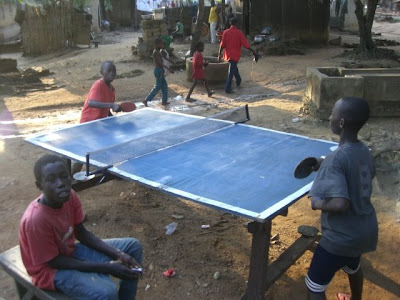
Coming to America.
No matter when you visit New York City, Times Square is an overwhelming spectacle. Skyscrapers, lights and sounds, great (expensive) food and restaurants, and a sea of people each engrossed in their own world. As I passed through Times Square walking from Penn Station to Grand Central last Sunday, I felt worlds away from Ghana. I spent the one hour train ride back to West Point reflecting on what our team did this summer, and what I learned along the way.
What we did.
Seven weeks in Ghana allowed our team to support a local non-governmental organization, Madamfo Pa, by teaching in the local schools, doing construction work to help build a library for the community, and sewing quilts that Madamfo Pa would sell for funds to support their projects.
During the first couple of weeks our team observed where best we could serve. I found my niche teaching grades 1-3 in the local school. With no formal training as a teacher, my greatest contribution was simply to encourage the children to love learning and enjoy school. Ghana's cities are developing rapidly, but the education system will prove inadequate if the rural areas don't keep pace in terms of education. Our team's parting gift to the village's primary school was a mural of the world painted on the side of the school building.
One of the summer's highlights was the Crossroads Cup, a soccer tournament our group organized for the community. Six teams from different villages participated in the event, and hundreds came to watch the action. It was a great exercise for me in terms of working with community leaders. I outlined our vision for the tournament, and the head-teacher took it from there, putting together a successful event.
The Crossroads Cup Penalty Kick Shootout
Marfokrom, Ghana
Marfokrom, Ghana
As a group we worked to educate the community at large on sanitation and health. In our final days in the village we donated trash cans and talked to the local leaders about the importance of disposing of waste in environmentally friendly ways. Ghana, like much of Africa, has a trash problem. Streets, neighborhoods, and almost every public area is littered with waste from water satchels to food wrappers. It will take years to clean up the country, but in the village of Marfokrom small steps of progress are being made.
A few of us branched out in other ways, too. One afternoon I taught one of the children how to use Microsoft Word at the nearest internet cafe, and at church one Sunday I had the chance to speak at a local church service with the support of a translator. Soccer proved to be my most effective means of making friends (with ping pong a close second), as I coached a team at recess, helped organize the soccer tournament, watched a professional match in Kumasi, and played for the local team in a tournament.
And, of course, we travelled. We spent a weekend in Kumasi experiencing West Africa's largest market, a weekend in Cape Coast re-tracing President Obama's footsteps and visiting Africa's oldest European built castle, and a few final days on the beach.
Along the way I ate goat and banku, got around in tro-tros, received treatment through Ghana's universal healthcare system, learned some 'Twi', and even gave a sworn statement in a local police station. The seven weeks went by all too fast.
What we learned.
When you live in a village where the richest still make less than $1.50 a day, you learn a lot about poverty, life, and what's truly important. The lessons that we learned are many, but a few stand out above the rest.
First, Africa - and Ghana in particular - is a rich country. Despite the oil and resources, the country is not rich economically; the majority of their citizens make well less than $2 a day, and corruption creates a headache for a national economy with unlimited potential. Even so, Ghana is rich in hospitality, and its people are rich in their zeal for life, community, and God. After spending five minutes with a Ghanaian I would typically conclude that they're much better off than most Americans, as most Americans would surely envy their contentedness, value of family and friendships, and humility.
Fun with rocks: "San San Kro Ma"
Spending time in the school we learned that the problems with education in Ghana are mainly institutional. Despite the promise that the children show, their potential is unlikely to ever be met without teachers who are better trained and better paid.
As a group we also learned about each other. A group of nine foreigners working with five Ghanaian counterparts, we learned how to adapt to difficult living conditions, budget and plan an operation according to the group's mission, and overcome challenges we faced through group conflicts, individuals leaving the group early, and sicknesses. After seven weeks together, the people who were strangers to me in June now feel like family.
We learned how to carry water on our heads, how to cook meals over an open fire, how to wash our clothes by hand, and how to shower with just a bucket of water. And perhaps best of all, we learned how to make much of little, use minimal resources for great undertakings, and become a part of a true community where life is public and possessions, joys, and hardships are shared.
It was a summer I hope to never forget, and a part of the world I look forward to returning to some day. Thanks for reading.
-----------
The best of the summer's pictures
All 600+ pics on Flickr











